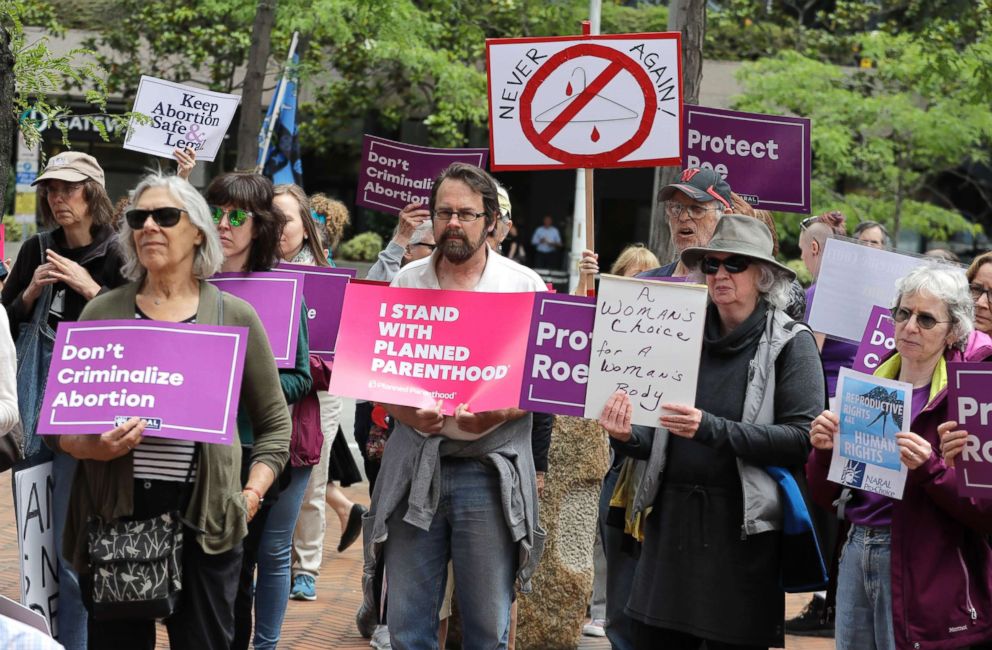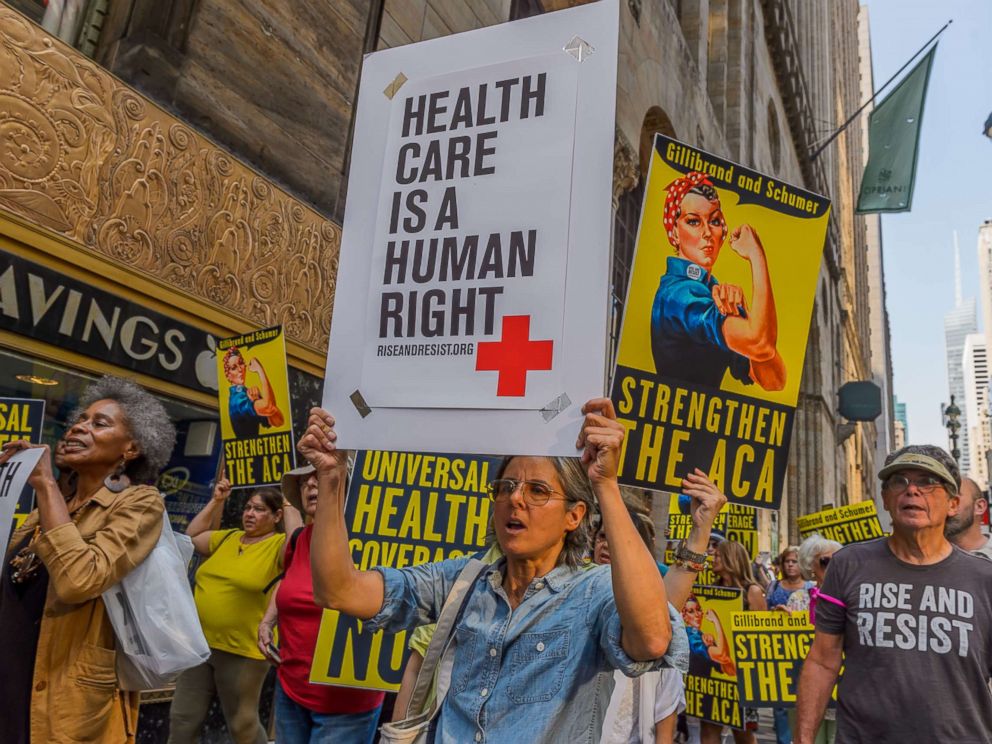
Interested in Midterm Elections?
Add Midterm Elections as an interest to stay up to date on the latest Midterm Elections news, video, and analysis from ABC News.More than just the hopes of politicians are on ballots as voters also take up statewide measures to enact policy reforms. And those statewide reforms may influence national policy.
The issues this election cycle include marijuana legalization, abortion rights and suffrage for felons. The results will offer insights into voter moods and the forces driving Americans to the polls.
Here are some of the most consequential state measures across the country:
Legalization of recreational marijuana
State-level approval for marijuana use has been growing in recent years. Colorado and Washington were the first states to legalize recreational marijuana through a ballot, Oklahoma voters approved medical marijuana in June and Vermont legalized recreational marijuana in July.
Now, seeking to continue the momentum, a number of similar measures are up for consideration.
Voters in Michigan and North Dakota were deciding on legalizing marijuana for recreational use, while Utah and Missouri were taking up a measure to approve medical marijuana.
In Michigan, the legalization of recreational marijuana, also known as Issue 1, supports the legalization of marijuana for people who are 21 and older and would enact a 10 percent sale tax. If approved, it would make Michigan the first state in the Midwest to legalize the possession and use of recreational marijuana. The measure would also permit users to domestically grow up to 12 pot plants.
 Jason Franson/The Canadian Press via AP
Jason Franson/The Canadian Press via AP
North Dakota is taking a different stance on its marijuana measure. The state would not only legalize pot for people over 21, but also automatically expunge criminal records of individuals with marijuana convictions. Unlike Michigan, the measure would not place a tax regulation on sales.
Voting rights for felons
In Florida, voters are weighing in on an amendment that might shift Florida’s political climate. If approved, the initiative would restore voting rights to the majority of felons who have completed their sentences.
A provision of the Florida constitution, with Jim Crow–era roots, prevents more than 1.5 million Floridians — a disproportionate number of whom are black — from voting, according to the Brennan Center for Justice.
Florida is one of three states, along with Iowa and Kentucky, to permanently bar all citizens with felony convictions from voting, according to the Brennan Center.
Multi-award winning Grammy pop star Rihanna has backed the measure.
"VOTE YES on Amendment 4 to restore voting rights to folks who have already paid their debt to society," Rihanna tweeted.
FLORIDA: You have the opportunity to make history this election. Let’s #bringithome. Vote @andrewgillum. And VOTE YES on Amendment 4 to restore voting rights to folks who have already paid their debt to society. VOTE on November 6th! https://t.co/ApH5hN7anc pic.twitter.com/Kpxz9XleYZ
— Rihanna (@rihanna) November 4, 2018
The measure comes after a federal appeals court blocked an injunction by U.S. District Judge Mark Walker in March. He ruled Florida's system that requires felons wait five years to petition the governor and three elected Cabinet members for the right to vote was “fatally flawed,” according to the Tampa Bay Times.
Abortion on the ballot
With a conservative-leaning Supreme Court now in place after the addition of Justice Brett Kavanaugh, many abortion rights advocates are concerned about the impact of his confirmation on Roe v. Wade.
According to a Pew poll, abortion is a pivotal concern for voters, with 61 percent of Democrats saying that abortion is very important to their vote this year.
At stake in several states is access and funding for abortions. Alabama, Oregon and West Virginia voters are deciding on ballot measures that challenge Roe v. Wade and could impact women’s rights if the landmark 1973 decision is overturned.
Alabama voters are taking up a proposed constitutional amendment, which seeks to "recognize and support the sanctity of unborn life and the rights of unborn children, including the right to life."
The measure would rewrite the state’s constitution, and effectively eliminate the right for a woman to obtain an abortion in Alabama, according to the National Conference of State Legislatures.
West Virginia and Oregon’s ballot measures want to prevent federal dollars from funding abortions for those people covered by Medicaid and public insurance plans.
 Ted S. Warren/AP
Ted S. Warren/AP
West Virginia’s amendment would add to the state constitution: "Nothing in this Constitution secures or protects a right to abortion or requires the funding of abortion."
The initiative, if approved by voters in the Mountain State and if Roe v. Wade were overturned, could potentially make certain that the state’s constitution would not allow abortions.
In Oregon, a measure on the ballot that would prohibit public funds from being spent on abortions, except when medically necessary or required by federal law.
An abortion would qualify as “medically necessary” if a licensed physician determines that a woman would suffer an injury or death unless an abortion is performed, according to the initiative’s text.
Democratic Oregon Gov. Kate Brown opposes the initiative, but through this measure, voters in Oregon would have the final say.
Healthcare at stake
Healthcare is a prominent theme in this midterm election. Voters in four conservative states, including Montana, Idaho, Nebraska and Utah, have the chance to expand Medicaid.
Medicaid is the main government-funded source of health insurance for low-income and disabled individuals. The Affordable Care Act, also known as Obamacare, guarantees that all individuals are insured under Medicaid.
Currently, one out of six people are insured with Medicaid and there are 32 states that have already expanded Medicaid.
Tuesday's votes on Medicaid were the first time voters weighed in since Republicans attempted to repeal the Affordable Care Act in 2018.
 Erik McGregor/Pacific Press/LightRocket via Getty Images
Erik McGregor/Pacific Press/LightRocket via Getty Images
A vote for the ballot measures would require each of the four states to provide Medicaid for individuals under the age of 65, with income equal or below the poverty line. If the initiative is passed in each state, the expansion of Medicaid would insure an additional 325,000 individuals.
Patient care in Massachusetts
Massachusetts voters were also being asked a question about patient care.
A certified question on the ballot would impose a limit on the number of patients a nurse could be assigned to during a shift. If a nurse were to violate the imposed ratio, the hospital would be fined $25,000.
The Massachusetts Nurses Association, which represents 20 percent of nurses in Massachusetts, implemented the initiative. The union argues it would improve the safety of nurses, patients and improve patient care.
The opposition suggests that the implementation of the rule would prompt a nursing shortage, cause hospitals to close if they could not staff enough nurses and could increase emergency room wait times, especially during mass casualty events or an outbreak.
Kaynak:Abcnews
Yorum Yazma Kuralları
Lütfen yorum yaparken veya bir yorumu yanıtlarken aşağıda yer alan yorum yazma kurallarına dikkat ediniz.
Türkiye Cumhuriyeti yasalarına aykırı, suç veya suçluyu övme amaçlı yorumlar yapmayınız.
Küfür, argo, hakaret içerikli, nefret uyandıracak veya nefreti körükleyecek yorumlar yapmayınız.
Irkçı, cinsiyetçi, kişilik haklarını zedeleyen, taciz amaçlı veya saldırgan ifadeler kullanmayınız.
Türkçe imla kurallarına ve noktalama işaretlerine uygun cümleler kurmaya özen gösteriniz.
Yorumunuzu tamamı büyük harflerden oluşacak şekilde yazmayınız.
Gizli veya açık biçimde reklam, tanıtım amaçlı yorumlar yapmayınız.
Kendinizin veya bir başkasının kişisel bilgilerini paylaşmayınız.
Yorumlarınızın hukuki sorumluluğunu üstlendiğinizi, talep edilmesi halinde bilgilerinizin yetkili makamlarla paylaşılacağını unutmayınız.












Yorumlar
Kalan Karakter: